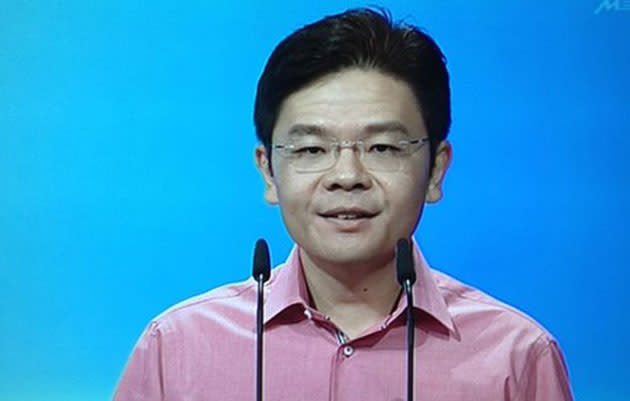What does it mean to be ‘politicising’?

COMMENT
Lawrence Wong's outburst online, accusing some of politicising "every activity or conversation", is just the latest in the government's penchant for such accusations.
"Politics is important," Wong wrote on his Facebook page. "But surely we do not want to end up in a situation where every activity or conversation in this country becomes politicised, where our people are polarized by political beliefs, where Singaporeans are set against Singaporeans based on creed or political affiliation."
Just a few weeks ago, Law Minister K Shanmugam basically pointed the same finger at opposition Workers' Party (WP) Member of Parliament (MP) Sylvia Lim for the same. Lim had asked about whether the Attorney General's choice of charges against surgeon Woffles Wu had addressed "public concerns about the equitability of the legal system."
Shanmugam replied, asking that Lim should base her position on facts, ""rather than referring to some unnamed lawyers she says know better".
"Because I think if we leave aside politics and we want to be honest and fair, that we must look at the facts," the Law Minister said.
On 20 September, blogger and activist Alex Au and the group Function 8 were accused of "mixing religion with politics" after Au had written about the meeting between the Archbishop of Singapore's Catholic Church and the Minister for Home Affairs, prior to the Archbishop withdrawing his letter which purportedly expressed support for a Function 8 event at Speakers' Corner in June.
"This deliberate breach of the Archbishop's trust confirms the objective of this group to publicly involve the Catholic Church and the Archbishop in their political agenda," the MHA said in its statement.
In all three instances, the authorities effectively accused the other parties of politicising the issues.
But what exactly does "politicising" the issue mean?
In Wong's posting, it seems he is referring to criticisms of certain events which the authorities had conducted. Lim's case had to do with questions about the Attorney General's choice of charges in a case. In the incident involving Au and Function 8, the issue was about questions raised over the MHA's involvement in the Archbishop's withdrawal of his letter of support for an event.
Were critics, Lim, Au and Function 8 "politicising" the issues?
It is hard to see how raising questions — legitimate questions — and criticisms could be seen as "politicising" the issues. On the contrary, to assign such a label to these legitimate concerns means the government is able to avoid the issues without addressing them.
For example, accusing Au and Function 8 of "mixing religion and politics" ignores Au's legitimate question of MHA's alleged behind-the-scenes actions in the Archbishop's withdrawal of his letter. It leaves a vacuum which is then taken up by conspiracy theories, speculations and further criticisms.
Yet, while the government points fingers at others, it has also politicised many areas of our lives here in Singapore, and critics would — and indeed have — pointed to these. For example, the politicisation of the grassroots such that defeated candidates of the ruling People's Action Party (PAP) get to call the shots, as advisers, in the constituency in which they were defeated. HDB upgrading projects, for the longest time, were prioritised to the advantage of constituencies which had voted for the PAP.
After the General Election last year, Desmond Choo, defeated candidate in Hougang in the May elections to the WP's Yaw Shin Leong, applied to the HDB to lease six plots of land in the Single-member Constituency (SMC) for use by the grassroots organisations (GROs) which he is adviser to.
Soon after, it was revealed that the HDB had also leased out 26 plots of land in Aljunied GRC, which had been won by the WP in the elections, to the grassroots organisation, the People's Association (PAP). The move prompted the WP to release a statement in which it said:
"A check on the sites, which were part of the common property managed by the former Aljunied Town Council but now leased to PA, showed that many of them are strategically located, being hard courts or amphitheatres highly suitable for organising social activities. We were puzzled about the intention behind the move, which occurred before the new management took over the estate. We are left to conclude that the decision by the HDB to shift management of these common properties from the Town Council to the PA was precipitated by the victory of the Workers' Party in Aljunied GRC in the General Elections."
These are just some examples of how the ruling party has politicised what should be common utilities and facilities to be shared by all.
In an earlier article, this writer called for such bias to be removed.
Otherwise, the accusations coming from the PAP is not going to cut any ice with the public. On the contrary, they will be seen as hypocritical and disingenuous. Until and unless these are disentangled and de-clawed — that is, de-politicised — from the tight-fists of theruling party, Ministers and MPs who make such accusations will only be generating more criticisms against the Government.
As Wong himself so eloquently posted, "[Surely] we do not want to end up in a situation where every activity or conversation in this country becomes politicised, where our people are polarized by political beliefs, where Singaporeans are set against Singaporeans based on creed or political affiliation."
Now, if only the ruling party would take Wong's advice seriously.


